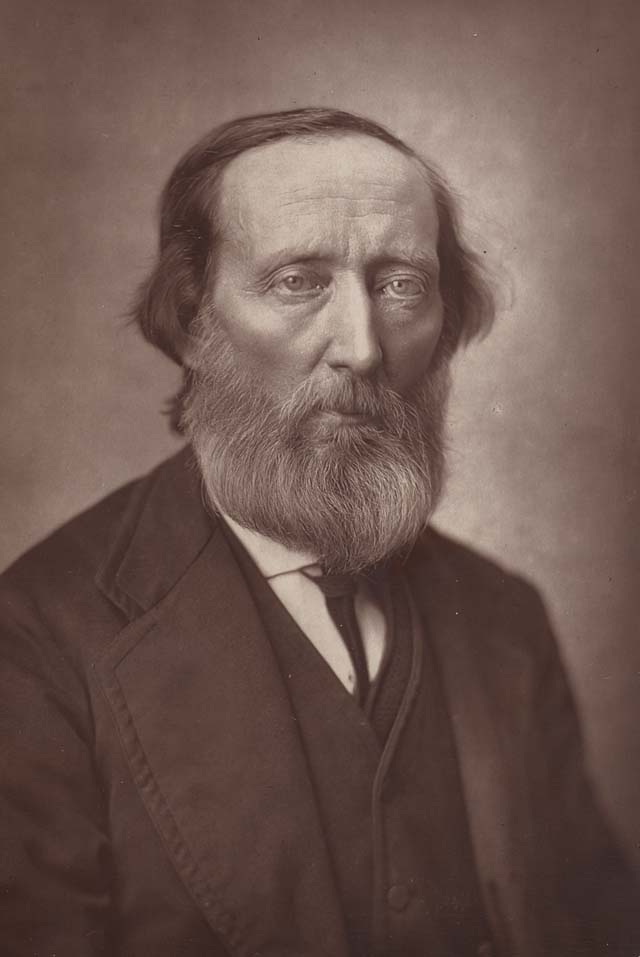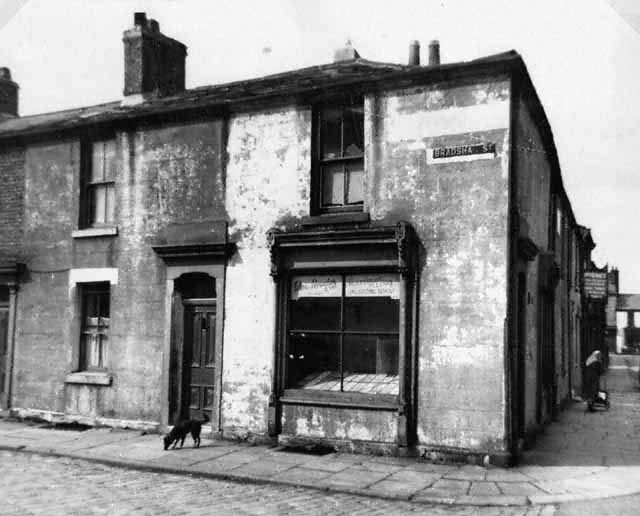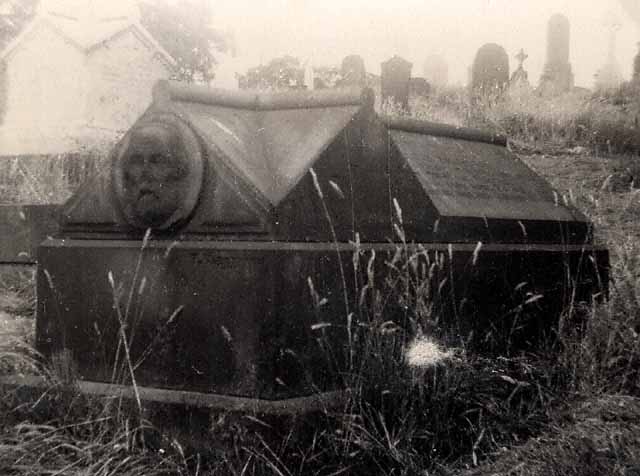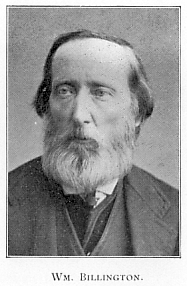|
OH!
this is a steam-born and iron-bound age
Of factories and foundries, of gold and of gain,
Of prisons and workhouses—Want's heritage!
Of railways and rivalry, paupers and pain,
Of printing and preaching, and men who mortgage
Their souls to serve Mammon, the god of the age! |
|
From... THE
GOLDEN GOD |
|
|
 |
|
WILLIAM
BILLINGTON
(1825-1884)
"The Blackburn Poet." |
WILLIAM BILLINGTON was born at Samlesbury in the Ribble valley on 3rd April
1825. His unemployed handloom weaver parents, Benedict and Ann, were at
the time working as road navvies, Benedict as a labourer and Ann
breaking stones. Benedict died aged 38 in 1832, with three of his children
dying from tuberculosis before 1837. Ann supported the four survivors, two of whom were invalids, by handloom weaving, going without sleep
and helped by
William during one night per week.
Billington learned to read and write at Catholic Sunday Schools, and although his mother was illiterate, she knew many songs,
which she sung to William during their night-time work. These songs and satires composed for oral performance by her brother, Robert Bolton, and the example of Richard
Dugdale, 'The Bard of Ribblesdale', with whom Billington began a lifelong friendship in his teens,
inspired him to write poetry.
Billington loathed the factory work through which he supported his family in Blackburn after marrying Elizabeth Whalmsley (d. 1857) in 1846.
Due to ill health, he became a publican after his second marriage to Maria Fairbottom
in 1868. Although both wives were illiterate, and Maria abandoned
him and their young child in contempt for his intellectual interests,
Billington was an insatiable autodidact. He committed to memory
many lines from the major English poets, from Chaucer to Wordsworth, was
a founder member of the Blackburn Mechanic's Institute, taught grammar
in a school in exchange for lessons in mathematics, advised trade
unions, lectured on and debated religion and politics at any
opportunity, and formed a Mutual Improvement Society, which met in a
hayloft. He travelled around the North and Midlands to read and
sell his poems. The beer shop he ran in Bradshaw St. from 1875
became the forum for Billington's debating skills; known as 'Poet's
Corner', it was where Blackburn's large coterie of dialect poets met,
for, despite its owner's penchant for devastating criticism, his "conversation—mesmeric in its influence—charmed everyone who sat beneath
its spell" (Robert West Whalley).
|
SALFORD
BRIDGE—
That popular resort of the great unwashed. |
|
Blakewater
hath a broad bridge stretched across
It, consecrated to the goddess Sloth;
There may be seen the vulgar, vile, and gross,
The lame and lazy—rich and ragged, both;
And many a greasy fop in threadbare cloth;
The idle huxter and slink butcher too;
Men that do nought, and men with nought to do;
The Monday-lurking tailor, smith, and snob;
'Jours,' tramps, and scamps, and beggars out of job,
And vagabonds whose names the muse would
loathe
Insults
the passer-by with shocking jibe and jeer.
WILLIAM
BILLINGTON
|
|
 |
|
Poet's Corner, the humble beer-house at the corner of
Nab Lane and Bradshaw Street, which played so
important a part in Victorian Blackburn's literary life, for it was here
that both the town's and visiting poets gathered under the aegis of 'mine host',
William Billington. Among the habitues were
John Critchley Prince, Richard
Dugdale, Thomas Chippendale, Ralph Ditchfield, Clemesha, Yates,
Jardine and many of the others that appear in George Hull's
anthology of Blackburn
poets.
Photograph by kind permission of
Blackburn & Darwen Community History.
_____________________________ |
|
"At about sixteen or seventeen I awoke to the fact that I
was—with all my
schooling—an ignorant boy. Along with other youths—John Walker among
them—I
joined a class for the study of English grammar and belles-lettres. We met
in the cottage of a member, with Poet Billington as teacher. Never shall I forget
his opening lecture! Billington was a model teacher, and gave us a
thorough grip of grammar and a passable knowledge of rhetoric, and led us
on to an abiding love of the sweet pastures of English literature. I am
under
lasting gratitude to him."
Luke
S. Walmsley
_____________________________ |
|
|
GERALD MASSEY |
|
Sweet-numbered poet, proudly we thy name
Behold among the British bards inscribed,
In golden letters, on the List of Fame!
A second Burns, that never could be bribed,
By Fear or Favour, to forsake the class
Whence thou didst spring—the lowly labouring
mass,
Whose feelings, fears, and hopes have tipped with
flame
Thy potent pen! Let not occasion pass—
Portray their wrongs, regardless of the blame
Which Cant may cast on thee, in hope to tame
Thy scathing indignation! Let thy tongue
Be ever heard in humble Worth's defence,
And may the Muses still inspire thy song
With truth, and love, and life-instilling eloquence!
WILLIAM
BILLINGTON
|
The subjects of Billington's writings in newspapers,
broadsheets and pamphlets ranged widely. His reputation at first was
as a public denier and assailant of ... religious
belief (W. A. Abram, "Blackburn Characters of a Past Generation" 1894), but
by the time of his death he
had become known as
"The Blackburn Poet" and has since been
remembered mainly for his dialect ballads about the impact on workers of
the "Cotton Famine" of 1861-64. Published as a broadsheet at the
height of the Famine, Th' Shurat-weyvur's
song sold 14,000 copies and, like Aw wod this war wur
ended of 1863, it has been anthologised frequently. Two
collections of Billington's poems, many of which first appeared in The Blackburn Standard and
The Blackburn Times,
were published as
Sheen and Shade (1861) and Lancashire Songs with other Sketches
(1883). Pendle Hill,
published as
a pamphlet in 1876, is a pleasing narrative cast in thirty-nine
Spenserian stanzas in which the poet recalls the events and his impressions of a
summer day's outing with friends to Pendle Hill and to Chiltheroe Castle in Lancashire
(see also John Rushton's
Pendle Hill).
|
"....not long before Billington's death the writer
[George Hull] called upon him and found him not only ailing in
body but
depressed in mind. He was toiling, with evidently painful effort, at one
of his articles for the Blackburn Standard; for notwithstanding his
facility in speech
and mental composition, his actual handwriting was slow and laborious. In
answer to inquiries as to the cause of his depression, he expressed the emphatic opinion that those articles were killing him.
'Fancy!' he
exclaimed, 'a column every week! It's too much, man; I can't stand it. It's killing me; that's
certain.'"
George Hull, "The
Poets and Poetry of Blackburn" |
William Billington's health eventually deteriorated
and he succumbed to heart disease and bronchitis on 3rd January, 1884. Despite his humble
origins,
he educated himself to become a very popular and respected writer and teacher.
He put into words the lives and times of the Lancashire cotton mill workers, thus helping
them to better understand the often miserable conditions in which they
lived. Sadly, The Blackburn Poet only received the recognition that he deserved towards the end of his life.
|
CENSUS
INFORMATION: BLACKBURN |
|
YEAR |
ADDRESS |
NAME |
RELATION |
CONDITION |
AGE |
PROFESSION |
| 1851 |
219 BYROM
STREET |
WILLIAM BILLINGTON |
HEAD |
MARRIED |
25 |
COTTON WEAVER |
| |
|
ELIZABETH
ditto |
WIFE |
MARRIED |
23 |
ditto |
| |
|
MARY
ditto |
DAUGHTER |
|
1 |
|
|
_____________________________ |
| 1861 |
56 HARWOOD
STREET |
WILLIAM BILLINGTON |
HEAD |
WIDOWER |
34 |
TAPE SIZER |
| |
|
MARY
ditto |
DAUGHTER |
UNMARRIED |
11 |
|
| |
|
WILLIAM
ditto |
SON |
UNMARRIED |
8 |
|
|
_____________________________ |
| 1871 |
144 NORTHGATE
NAGS
HEAD INN |
WILLIAM BILLINGTON |
HEAD |
MARRIED |
43 |
LICENSED
VICTUALLER |
| |
|
MARIA
ditto |
WIFE |
ditto |
36 |
|
| |
|
WILLIAM
ditto |
SON |
UNMARRIED |
18 |
PRINTER'S
APPRENTICE |
|
|
|
JOHN
BRIGHT
ditto |
SON |
ditto |
2 |
|
|
_____________________________ |
| 1881 |
176 BRADSHAW
ST.
POETS'
CORNER |
WILLIAM BILLINGTON |
HEAD |
MARRIED |
53 |
BEERSELLER |
| |
|
JOHN
BRIGHT
ditto |
SON |
-- |
12 |
SCHOLAR |
| _____________________________ |
|
Manchester Guardian
19th June, 1886.
LITERARY AND OTHER NOTICES.
________
It is proposed to raise a memorial to the late Mr. William
Billington, of Blackburn, whose writings in the Lancashire dialect
were exceedingly popular. A circular has been issued in which
it is stated that Billington, "a self-educated working man, was
especially in his element when championing the cause of the working
classes; and every movement that had for its object the amelioration
of the condition of the masses found in him an earnest and eloquent
advocate. During the disputes that have unhappily taken place
between capital and labour in the past William Billington more than
once laid not only employers and employed but the town itself under
obligations to him by the seasonable and judicious advice he gave to
those represented by the different trades, and which being acted
upon averted a threatened rupture, or settled at the outset what
might otherwise have proved a prolonged strike." A committee
has been formed to carry out this undertaking. |
|
 |
|
William Billington's grave
"Good friend, for Jesus sake forbeare."
ERECTED BY PUBLIC SUBSCRIPTION TO THE MEMORY OF
WILLIAM BILLINGTON
(AUTHOR OF 'SHEEN AND SHADE', 'LANCASHIRE SONGS,
POEMS, AND SKETCHES', &c.)
|
"Dead and yet living—living in that verse
Our children shall rehearse;
Cleaving to what is fair and good and wise.
Let the dross pass away,
Let meaner things decay—
The poet never dies."
|
|
|
|
____________________ |
|

TO THE MEMORY
OF WILLIAM
BILLINGTON
(who died January 3rd 1884) |
|
The Singer has departed; and no more
Is heard his voice, so strong and clear and sweet,
Cheering the crowds, in factory and in street,
With melody, as in the days of yore.
His was a master-mind; and 'twill be long
Before old Blackburn, through the smoke and gloom
That gather round the busy lathe and loom,
Shall see another half so bright in song.
He needs no lays to blazon forth his name,—
His own will bear it o'er the sea of time!
Yet I, a child of song, to whom he came
With friendship true and counsel most sublime,
Would to his memory dedicate this stave,
And lay my simple wreath upon his grave.
GEORGE
HULL |
|
|
_________________
|
ODE
ON THE
DEATH OF
WILLIAM
BILLINGTON.
Dead, dead! and in the world's dull ear
The word is scarcely spoken ere 'tis fled,
But to the chosen ones who held thee dear
That one word "dead"
Is sudden shock,
As if some ship at sea,
Whilst sailing free,
Dashed on a rock.
Dead, dead, ah me!
We know not what it is to cease to be,
But thou, and others who have gone before,
Have drawn the curtain
Of the
Uncertain—
Or fallen into Lethe's "Nevermore."
Thou wert a part of me
As I of thee,
As "all are parts of one stupendous whole."
This Christmastide
We side by side
Enjoyed, with well attempered glee,
"The feast of reason and the flow of soul;"
Yet in the new-born year
I stand
beside thy bier—
Oh, that life should be cheap, and yet so dear!
I turn my aching eyes to other days
When, with no care of wind or weather,
We gave God praise
That He made moorland glorious with heather,
And gave us strength to climb the hills together.
And then the converse sweet, and bold, and strange
To me in those young days when life was new;
Subtle and bright, yet deep and wide in range.
As lightnings flash from peak to peak, thus flew
Thy living thoughts, when, gaining heights sublime,
Scawfell's or Snowden's crown,
We looked, exultant down,
On vale, mead, lake and tarn, the eldest-born of Time.
Thou hadst thy weaker moods, and who has not?
The eagle looks not always at the sun.
Fated to struggle with a lowly lot,
Thy life a course of "Sheen and Shade" has run.
Lowly, and yet how high
Time yet shall testify:
For voiceless crowds,
(Like hurrying clouds)
Go by, and are forgotten as they perish,
Until one comes like thee
Gifted
with melody—
A singer whose sweet song the world will cherish.
Dead, and yet living—living in that verse
Our children shall rehearse,
Cleaving to what is fair, and good, and wise;
Let the dross pass away,
Let
meaner things decay—
The poet never dies.
JOHN
WALKER
The last stanza of this Ode
is inscribed upon Billington's tombstone
in Blackburn Cemetery. |
_________________
|
LINES WRITTEN
ON READING THE
ACCOUNT OF THE
DEATH
OF THE POET,
WILLIAM BILLINGTON,
IN THE
"BLACKBURN TIMES,"
JANUARY 5TH.
1884. |
|
Call'd away! Oh it cannot be true!
Cried my heart, deeply pain'd to the care.
As I glanced at the sorrowful page.
That informed me my friend was no more.
Ah, little I thought 'mid the whirl
Of excitement so joyous and gay,
That the poet I honour'd and loved.
Like a martyr was passing away,
Far away from the earth with its cares
To the dim and mysterious shore;
That ne'er more should I grasp his warm hand,
That I'd see him and hear him no more.
Strange; we ne'er miss the friends that we love,
Till they leave us in sorrow and gloom;
Strange, we prize not the Song of the Bard.
Till the songster is laid in the tomb.
Thou art gone, now we know it too well;
All thy troubles and trials are past;
The pain'd look has gone out of thine eyes;
And we trust thou art happy at last.
Our last meeting so blithesome and free,
Full oft have I thought of it since;
How our guests were the Lords of the Lyre—
Shakespeare, Byron, Burns, Baron, and Prince.
When, forgetting thy weakness and pain,
Thy spirit ever ardent and strong,
Caught fire as thou warm'd to the theme,
And exultantly burst into song.
We have lost him—the fearless and frank—
Who regardless of favour or pelf
Freely gave to the world of his store,
Though he suffer'd in secret himself.
"I am one of the people," said he,
And his heart-stirring melodies tell
How for them he liv'd, labour'd, and sung,
Till at last in the conflict he fell.
Then ye sons, and ye daughters of toil,
Forget not to give him his due;
For whate'er was his lot throughout life,
He aye pleaded and battled for you.
Tutor'd early by Nature herself,
And full of her mystical fire,
With the hand of a master he swept
The strings of the tremulous lyre.
His note manly, tender, and sweet—
With a music that quickens, and cheers—
One moment is pregnant with mirth,
Then its pathos subdueth to tears.
Round his brow then the garland entwine,
For the laurel he nobly hath won,
And, while Pendle aspires to the skies,
Will Blackburn be proud of her son.
JOSEPH
JARDINE. |
|
Mr. Jardine was the zealous and
industrious Honorary Secretary of the Billington Memorial
Committee,
which undertook the raising of funds for the deceased poet's
portrait and monument. |
_________________
|
WHERE ARE THE BLACKBURN POETS GONE?
I met an acquaintance a day or two since,
A friend of the reedmaker poet, JOHN PRINCE,
A man whose acquaintance with men and with books
Hath seldom been rivalled, 'twas Mr. CHARLES ROOKS,
The "Junius of Blackburn" named, once on a time,
A master of prose and a critic of rhyme;
Whilst a tear and a tribute were paid to old John,
He asked,—Where the poets of Blackburn had gone?
My answer was ready, if time for a walk
Were at his disposal, the toil by the talk
Would be doubly repaid; he endorsed the remark,
Took my arm, and we sauntered along through the Park.
This scene was once rural and rugged enough,
A quaint rustic valley called Pemberton Clough,
Where "Ribblesdale's" gooseberry garden once shone,
But alas! both the "bard" and the garden are gone.
The time had been short but the changes were vast,
Our thoughts and our sympathies turned to the past,
And, with fond recollection, flew back to those days
When we loitered up Longshaw, or strolled through Damheys
With a posse of poets, though local in name,
Whose merit might match some of national fame—
Some are dead, some have fled, some have ceased to sing on,
But the most of the poets of Blackburn are gone!
Since HODGSON, and BARON, and DUGDALE are dead;
Since CHADBURN, and WALKDEN, and DALY are fled;
Since CLEMESHA, BRADLEY, and STEWART, and HUGHES
Have vanished; since SALISBURY deserted the muse;
Since ABRAM, and WALKER, and RAWCLIFFE, and YATES
Seem to rest on their laurels, defying the fates,
There's JARDINE, there's WHITAKER, WALSH, LITTLE JOHN—
Why, why are these silent, and where have those gone?
I replied, being queried, which did I like best,
The singing of GRAHAM, the silence of WEST,
The language of LITTLETON, least understood,
Or CHIP'S single song, and his "goose"?—which was good,
Don't hide in a napkin your talent, like WEST,
Nor scruple to sing, lest you should not sing best:
The steps to the heavens that glitter up yon,
Each rests on one lower, and all upon one.
He meets retribution, and merits it quite,
Who under a bushel obscureth his light;
The God-given talent should not be confined
To a circle of friends, when 'twas meant for mankind;
Go, lay out your money, in trade or in trust;
Machines when left idle will ruin and rust;
Or reckon all reasons, the pro and the con,
For singing we've many, for silence we've none.
The spink and the sparrow will twitter in spring,
The swift or the swallow in summer will sing;
The thickets with music in May will abound,
But the lark and the linnet sing all the year round.
Then why should the bards of my own humble sphere,
The gifted and goad, wham I'm proud to revere,
Relinquish the lyre, while the least worthy one,
In sadness of heart singeth—"Where are they gone?"
We've climbed up the mountains and sailed on the sea;
On beauty we've banqueted, bounding and free,
Britannia's green valleys we've traversed by times,
Making many-voic'd echo give answer in rhymes;
And we read the sweet poets of many a land,
Ere Death and old Time had divided our band;
But soon the last scene will be closing upon
One more, to be gathered to where they are gone!
In fine, may the bards of this smoky old town
By their confluent gleams add a glow to its crown,
"Like stars in one sky let them mingle their blaze
Of light, nor be jealous of each other's rays";
Like flowers in one garden put forth their bright bloom,
Nor envy the fairest its tints or perfume;
The pipes of an organ all vary in tone,
Their sound must be several, their music is one.
William Billington.
Poets' Corner, Nab Lane, Blackburn,
May 2nd, 1882. |
|

<>
|